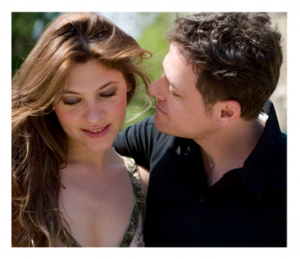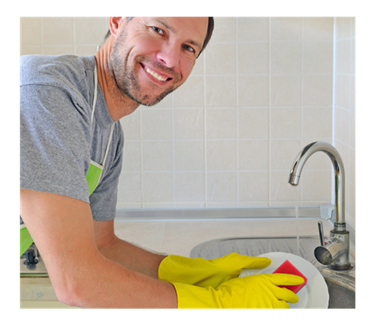Boyish charm is appealing, isn’t it?
 Or so many women believe when we’re dating. But if we marry a “boy” who stays a boy, are we doomed to mother him unhappily ever after?
Or so many women believe when we’re dating. But if we marry a “boy” who stays a boy, are we doomed to mother him unhappily ever after?
I’m thinking of Hank Moody in Californication. Sure, this character’s troublesome talents and steamy sexploits take him beyond boyish into devastation and disaster. But how many women fall for Bad Boy behavior – over and over again?
My relationship history is littered with the usual detritus of boys and men, though happily I outgrew Bad Boys in favor of Nice Guys and Nerds.
Yet any “type,” if I may be so bold, can still remain a boy – unwilling to be accountable, deflecting responsibility, and relying on a smile, a roll in the hay, or any other aspect of his attribute arsenal to undermine a woman’s resolve to expect more.
Is this really what we want? Are we, the women, part of the dilemma?
Does Marriage Make the Man?
May we now turn in our marriage manuals to the XY chromosomes in our midst…
Right. The guys. Not to mention how we raise our sons… from boys to men.
Do we wed ourselves to boyish charm and suddenly expect a grown man to emerge? Do we imagine we’re marrying a responsible adult, and subsequently find ourselves hitched to an adolescent?
On the topic of terminology – boyfriend, man friend, significant other and so on – this remark was rumbling around in my head:
Do we cease to treat [husbands] as men, thus encouraging behavior as boys? It is a very interesting concept and I do hope you explore this in more depth sometime in the future. It may explain a lot about why perceptions and actions tend to change in a marriage over time.
Do we marry boys and then expect them to change, acting like men? Do we marry men and somehow treat them like boys?
Single Mothers Raising Men
Raising kids alone?
I never thought I’d be doing it. I never thought it would last for 12 years. I never saw how I could do it successfully – raising boys to men – not that I could specify the parameters of Man-Raising “success.”
Throughout the years I was a single mother, I worried about what kind of men my kids would become. What did I know about the male of the species? What could I model? How could I avoid messing up?
How on earth could I raise good men – honest, decent, down-to-earth, and not Bad Boys?
Although I asked myself these questions, I was so busy trying to make ends meet and keep us going, I was more concerned about their being good people, and ideally, independent thinkers.
 Without question, I would have preferred they have models of manhood that I, personally, find worthwhile – men of substance, character, and humor who demonstrate behavior that is respectful, reliable, and thoughtful. Incidentally, these are the same traits I look for in friends of both sexes.
Without question, I would have preferred they have models of manhood that I, personally, find worthwhile – men of substance, character, and humor who demonstrate behavior that is respectful, reliable, and thoughtful. Incidentally, these are the same traits I look for in friends of both sexes.
Occasionally I ask myself… how did I actually get through it? What did I manage to model while raising my sons? What kind of men will they be? Did they in fact raise themselves as many of us did 30 years ago when the Parenting Scrutiny Spotlight shone with less intensity? Are they still “boys” – and if so, how much of that is that okay?
What Makes a Man Tick?
I reflect on my ex from time to time in light of gender roles, ethics, sexuality.
Do I know what makes him tick? Do I know what makes any man tick?
I thought so once, though I was wrong.
Yet my ex wasn’t a “boy” in our marriage. Of that I’m certain. Then again, there were aspects of selfish (boyish?) behavior that I saw when we were dating. I let the behaviors slide. No one’s perfect, I told myself. And certainly not yours truly.
Some of those behaviors intensified with marriage; still I let them slide, and again I know I’m in excellent company in doing so. But what causes (some) men to revert to boyish behaviors or push them to their limits? In what way might I have been complicit? Was I somehow emasculating him without realizing? Was I mothering him without seeing it as such?
Why was I expecting too little, and in a way treating him like a boy by letting him slide?
Questions Without Answers
The man I married was never a child in our relationship, though he was an effective charmer and extremely skilled at getting what he wanted.
Again, millions of women and men could say the same of their spouses or partners, current and former.
In reviewing our interactions, I can readily conclude that there were no emasculating behaviors and, best I can determine, few (if any) mothering behaviors as well. Still, since the marriage ended, I’ve learned more about what makes me tick, and done a better job – gradually – of finding men with whom I’m a good fit.
But treating men like boys is something I wonder about, and have observed. Is it something we do unconsciously? Is it a habit we fall into after motherhood? Is it a function of familiarity or taking each other for granted?
Then again, if it “works” in the couple, should we care?
Why Do Women Choose Bad Boys?
So why do women choose Bad Boys, especially once they’ve been burned? Is it the “bad” or the “boy” that we go for, or some irresistible mix of the two?
It’s easy to enumerate key elements of “bad” appeal:
- A dangerous edge can be sexy
- The elusive quality (and antics) keep us interested
- We want what we think we can’t “have”
 Of course, more profound issues may be at work to do with a woman’s self-esteem. She may feel she doesn’t deserve more than a part-time, selfish, and immature partner. Or she may not want a more reliable attachment.
Of course, more profound issues may be at work to do with a woman’s self-esteem. She may feel she doesn’t deserve more than a part-time, selfish, and immature partner. Or she may not want a more reliable attachment.
So what about the extent to which a woman is drawn to the boyish (charming, rakish, undependable) aspects of a man?
Is this a desire to “mother” after all?
On Doing Dishes and Raising Sons
I look to the relationship I am in now – three years, committed to each other, and with a sense of family. We may not have the Good Housekeeping Seal of Approval in terms of couple labeling, but we seem to manage without it just fine – most of the time.
There is plenty of boy in this man, or maybe I should say – just the right amount. He’s playful, but adult. He’s funny, but knows not to make fun when I’m being serious. There’s no bullshit, no excuses, no dodging responsibility.
And there we are… arriving at a Very Important Principle. Responsibility is the VIP. Deflecting it is aggravating, adolescent, and boyish in the ways that women resent over time, whereas an adult man, an honorable man, a communicative man will discuss, accept, and share responsibilities fairly.
When it comes to my sons, I’ve seen signs they understand responsibility, and what’s more, that they act on it. They’re still young, barely in their twenties, and only time will tell if they truly transition from boys to men. Much of that will be up to the families they themselves decide to construct, and the ways in which they engage with them.
You May Also Enjoy
There is a lot of meat here. I see a lot of younger mom bloggers make fun of their husbands or complain that they don’t take care of their responsibilities. But when I read between the lines I see a lot of “he does things differently than I do,”
That doesn’t mean it is wrong, it just means it is different.
While it is possible that different can end up meaning “he is irresponsible” it doesn’t necessarily have to be that way which I suppose leads into expectations.
Expectations are a funny thing. If you have never discussed them it is hard to know if they’ll be met.
There’s a lot of meat in your response, too, Jack.